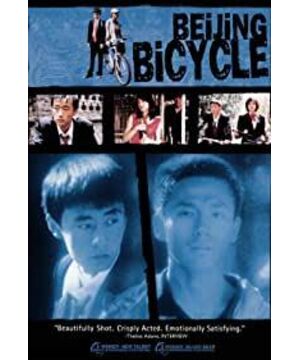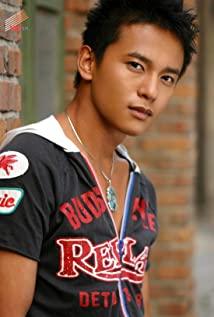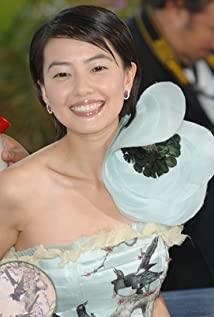Towards the end of "Seventeen-Year-Old Bicycle", the atmosphere of the film suddenly changed. One of the male protagonists, a high school student, angrily picked up a brick and was about to smash the "little gangster" who was leaning against his wall. I immediately remembered the corresponding time in "Qinghong", the hero couldn't help but was ready to rape his girlfriend. Is this our youth? Perhaps, the "we" here can only refer to boys. Wang Xiaoshuai's films seem to have no room for young women to express themselves.
Maybe I'm still very unfamiliar with movies as a freshman in college, and I always felt that "Qinghong" I made later was not as good as "Seventeen-Year-Old Bicycle". The background of the educated youth set in "Qinghong" is too far away, and it is not easy at all to successfully reproduce and impress the audience. "Bicycle" is very life-like. Although the habits of Beijing high school students are not liked by me as a southerner, they always remind me fondly of my Beijing roommates who smoke and call them buddies. Trendy, swearing, and even the tune of thinking...
However, what is youth? "Bike" begins with a scene in which the high school girl played by Gao Yuanyuan takes her favorite boy into the woods and closes her eyes in wait. Boys get it too: he should hold hands, hug or kiss her. However, the panic and restraint peculiar to youth made the protagonist hesitate and then give up. I thought again about my imagination of campus love in junior high school. It actually originated from an article in the selected essays. We have all read a lot of sample essays in selected essays, but I have a deep memory at that time, and there is actually an essay about the love between men and women. Fan Wen's ending, of course, is that girls "cunningly" call boys to wait, and we may be able to be together when we grow up...
Youth is naturally green, and it is the state where desire begins to germinate. For example, another male protagonist in Bicycle, a courier boy from the countryside, stared at Zhou Xun through a hole in the wall. This gaze is the gaze of youthful desire, and it instantly makes a boy dream of a woman who is completely unknown to him. The powerlessness of youth is particularly deep in this rural boy, because he only repeats: "This bicycle is mine", "This bicycle was originally mine", "I didn't come to take a bath", "It's none of my business" thing", and then there was silence, crying. Every time Zhou Xun appeared in front of him, he didn't dare to say a word.
Youth is also competitive to save face, for example, a boy must be able to smoke. The high school student's buddy stuffed him with a cigarette when negotiating with the rural boy. The first time he smoked, the boy made a fool of himself, causing a burst of laughter. Interestingly, the high school student himself did not smoke (he was a good student with excellent academic performance). When that sly punk came over to ask for fire, the high school student who had no fire on his body made a random search, and shamelessly admitted that he had no fire. The little gangster stuffed the cigarettes he had smoked into the mouths of the high school students with contempt, and blatantly took Gao Yuanyuan away. Later, the high school student smashed the gangster and told the rural boy that he didn't need the car in the future - he took out a pack of cigarettes and motioned to give the boy a cigarette. stiff. Presumably, he has now been reduced to the point where he can only pretend to be a B in front of a rural boy who is weaker than him...
Youth is naturally powerless, even though it often wears the mask of cruelty and violence. The boys in "Qinghong" are unable to keep the girl they like, and can only resort to violence to get her body, and finally pay the price of their lives. The high school students in "Bicycle" waited for their father to buy a car for a long time, and finally had to steal their own money and go to the second-hand market to buy a stolen car. The girl's sentence "I'll buy another car when the car is gone" annoys the boy's sensitive self-esteem, and rejects the girl's invitation unkindly. When the girl turned to other people's arms, he was jealous and angry, and smashed the bricks with a "fuck you". The pity is not only the revenge that he was later retaliated against, but also that the completely innocent rural boy was involved in the whirlpool - the boy who came from the countryside to the city and was exploited is completely powerless and hopeless. Seeing that his beloved bicycle was wantonly destroyed, he also picked up a brick and smashed it in the powerless...
The bicycle is a metaphor for youth. Bicycles are the objects of dreams, desires, games, collections and love of different young boys. It's either hard to come by or fragile. The role played by Zhou Xun only appears at the beginning and end, but it is also a successful image. It well expresses the love of young women for beautiful clothes and how the psychology of beauty is broken in reality. Just like rural boys and fellow villagers stared at Zhou Xun with desire, Zhou Xun also stared at himself in his master's clothes with desire (she was a nanny). The subtlety here is that rural men thought Zhou Xun was a woman from a distant city, but unexpectedly she was just a female nanny who entered the city from the countryside. Can she still awaken their hidden desires? The gaze is necessary because the object is the other, unobtainable but unforgettable. Bicycles, clothes, and sexual bodies are all fetishes like the money the city people chase. The innocence of youth does not lie in its lack of desire, but in the simplicity and specificity of its desire. If a boy or girl desires an abstraction like money, we cannot admit that it is a memorable youth. However, if he / she desires love, first kiss in hand and other intimate actions, competitive cycling sorts of stuff, nice clothes or bring a sense of achievement trophy, and we will miss to say: my youth was also so ......
thus probably It is conceivable that behind youth is the division between urban and rural areas, the struggle between abstraction and concreteness, and the opposition between rich and poor. Why do we have to grow up to accept the hypocritical indifference of the adult world? Why do we have to go into the city and accept the vicious exploitation and contempt of the city people? Why do we want to make money and accept the brutal employment competition of the commodity economy? Aren't these three questions the same? The native rural boy in "Qinghong" was unable to keep Gao Yuanyuan from an urban educated youth family background, and the urban boy in "Bicycle" did not dare to accept the love of Gao Yuanyuan from a well-off family because of his poverty, not to mention the silent desire and desire of the rural boy ("It turns out she was just a babysitter", "She ran away"). No matter where the film takes place is the frontier countryside where radio reception is difficult, or the advanced capital Beijing (not to mention the new Beijing after the Olympics, bicycles are no longer its scenery, and how to solve the problem of car gambling has become a major problem) , the logic behind the development of the plot is consistent.
Therefore, the greatest cruelty is not that youth is stifled, dreams are shattered, and simplicity is raped by evil, but that youth, dreams, and simplicity are essentially part of our original sin. It is powerless only because it is destroyed by a greater evil. The reason why we miss it is just because we are in a greater evil but we are unable to break free, so we have to make up a pure and innocent youth right as consolation. We resort to violent confrontation only because we are on the verge of despair and broken.
View more about Beijing Bicycle reviews









